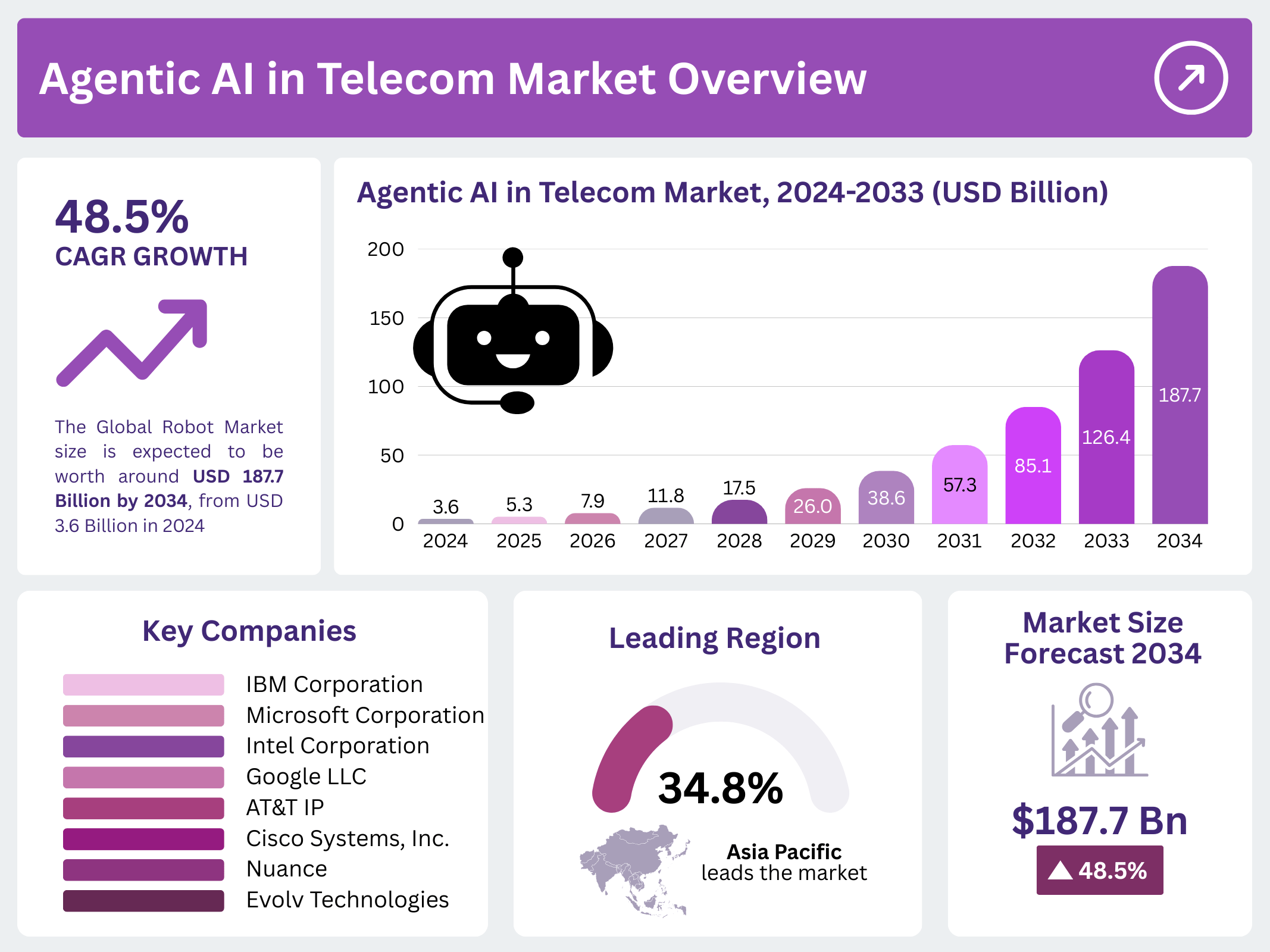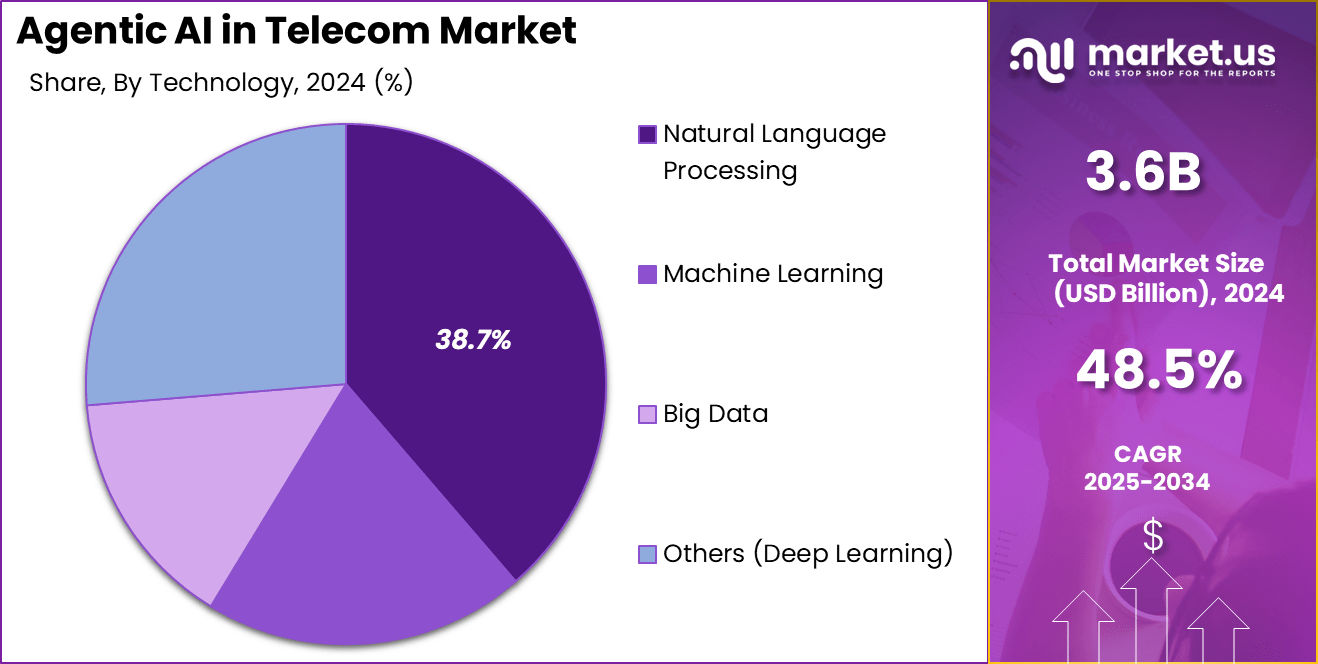
Quick Navigation
- Introduction: A New Era for Telecom With Explosive Growth
- Market Expansion Driving Economic Advancement
- Business Operations: Cost Structure and Supply Chain Evolution
- Key Business Strategies for Telecom Companies
- Use Cases and Growth Drivers: Tangible Implementations
- Regional Market Analysis: Leadership and Emerging Frontiers
- Business Opportunities Emerging in the Agentic AI Wave
- Key Market Segments Shaping Growth
- Competitive Landscape: Innovation Leading the Pack
- Recent Developments Accelerating Progress
- Analyst Perspective: Present and Future Outlook
- Conclusion: The Road Ahead for Telecom’s AI Journey
Introduction: A New Era for Telecom With Explosive Growth
The Global Agentic AI in Telecom Market is on the verge of a dramatic transformation, projected to leap from $3.6 billion in 2024 to $187.7 billion by 2034, boasting a stellar compound annual growth rate (CAGR) of 48.5%. Driving this momentum is North America’s commanding position, capturing 34.8% market share and producing $1.2 billion in revenue in 2024. This exponential growth illustrates the rapid integration of agentic AI technologies across telecom networks, signaling a pivotal shift towards intelligent automation, proactive operations, and next-generation customer experience delivery. Massive investments in AI infrastructure have set the telecom sector on a path to revolutionize global communications for the foreseeable future.
Market Expansion Driving Economic Advancement
Agentic AI is fundamentally altering the telecom industry’s economic footprint. Early adopters are reaping the benefits of reduced operational costs, improved network reliability, and heightened productivity. As these advanced systems automate repetitive tasks and enable real-time optimization, workforce efficiency climbs and the need for manual troubleshooting diminishes. Studies predict a ripple effect across the larger economy, with AI-powered telecom providers playing a central role in GDP growth, technology-driven employment, and digital inclusion. The sector’s transformation is underpinning smarter cities, streamlined business processes, and new opportunities for economic resilience on a global scale.
Smarter strategy starts here! Get the sample @ https://market.us/report/agentic-ai-in-telecom-market/free-sample/
Business Operations: Cost Structure and Supply Chain Evolution
Implementing agentic AI demands that telecom operators rethink traditional spending patterns as investment in advanced software platforms, scalable infrastructure, and workforce upskilling accelerates. The initial surge in deployment costs is counterbalanced by significant reductions in downtime and service disruptions, ensuring long-term value creation. Supply chain models are also being reconfigured to support rapid scaling, real-time analytics, and seamless digital integrations. AI-powered solutions are now optimizing everything from equipment maintenance and network monitoring to fraud detection and customer service management—driving sector-specific improvements that translate to more efficient supply chains and decreased operational bottlenecks.
Key Business Strategies for Telecom Companies
To maximize the business potential presented by Agentic AI, telecom operators must adopt a multifaceted strategic approach:
- Invest in scalable, interoperable AI platforms for automation and analytics.
- Prioritize continuous employee development with a special focus on AI and data science skillsets.
- Establish comprehensive ethical AI frameworks and ensure strict data privacy.
- Modernize legacy infrastructure to support agility and rapid innovation deployment.
- Forge strategic partnerships with technology providers, research hubs, and startups to accelerate collaborative progress.
Proactive implementation of these strategies is imperative for companies aiming to harness the full spectrum of benefits Agentic AI offers while staying ahead of industry trends.
Use Cases and Growth Drivers: Tangible Implementations
| Use Case | Growth Drivers |
|---|---|
| Automated Network Management | Constant monitoring, uptime improvement, error reduction |
| Predictive Maintenance | Cost optimization, prevention of unplanned outages |
| Personalized Customer Support | Demand for instant AI-driven resolutions |
| Fraud Detection | Surging security threats, increasing data complexity |
| Dynamic Bandwidth Allocation | IoT proliferation, need for real-time network responses |
Telecom operators are deploying agentic AI for advanced network management, predictive maintenance, and fraud detection, which address the pressing challenges of increased data volume and greater demand for reliability. Personalized customer support powered by AI bots is delivering round-the-clock service, while dynamic bandwidth allocation is making networks responsive to fluctuating user environments—especially as IoT adoption grows.
Regional Market Analysis: Leadership and Emerging Frontiers
North America’s preeminence in the Global Agentic AI in Telecom Market stems from mature digital infrastructure and early acceptance of AI technologies; it will maintain its lead with a 34.8% share and $1.2 billion revenue in 2024. Asia-Pacific follows, fueled by brisk telecom expansion and transformative digital investments in China, India, Japan, and Southeast Asia. Regulatory advances and widespread 5G rollout reinforce Europe’s steady market growth. Regions like Latin America, the Middle East, and Africa are demonstrating promising market potential with increasing mobile penetration, investment in smart networks, and supportive policies. These trends highlight a global wave of Agentic AI adoption, but also call for regionalized approaches addressing compliance, scalability, and digital readiness.
Business Opportunities Emerging in the Agentic AI Wave
The surge in Agentic AI presents telecom operators, vendors, and technology startups with unprecedented opportunities for growth. Enterprises can leverage AI solutions to automate network administration, launch predictive analytics services, and differentiate through personalized customer engagement. Agile adaptation to evolving consumer needs and swift integration of intelligent platforms open doors to innovative product lines, operational excellence, and expanded customer bases. Startups are now entering the market with disruptive solutions, challenging incumbents, and fostering a healthy competitive ecosystem. Organizations equipped to redesign business models around agentic AI will experience improved profitability, broader market reach, and a sustained advantage in the telecommunications sector’s next chapter.
Key Market Segments Shaping Growth
The Agentic AI in the Telecom Market is divided into distinct segments that enable operators to address diverse challenges and user requirements:
- Deployment Models: Cloud-based, On-premise, Hybrid systems
- Applications: Network management, predictive analytics, customer care, bandwidth optimization, fraud detection
- Industry Verticals: Mobile networks, broadband providers, telecom equipment vendors
- Organization Size: Large enterprises, SMEs
Each segment encompasses unique priorities related to data governance, system scalability, compliance, and security, influencing how AI technologies are implemented and what outcomes businesses can expect. Telecom companies are increasingly focusing on hybrid deployments for flexibility, while large enterprises lead in AI investments and SMEs contribute to innovation through agility.

Competitive Landscape: Innovation Leading the Pack
Distinguished market leaders are driving sectoral evolution through robust R&D, extensive platform launches, and strategic alliances. Competitive advantage hinges on expertise in AI agent development, regulatory acumen, and commitment to cybersecurity standards. Companies are emphasizing integrated offerings, interoperability with legacy systems, and nurturing developer ecosystems to maintain relevance. Continuous innovation, adherence to regulations, and collaborations with academia and other industries define the competitive environment as the market rapidly evolves.
Recent Developments Accelerating Progress
- Launched advanced AI agent platforms that automate network management, deliver multilingual support, and elevate customer service across regions.
- Spearheaded large investment initiatives in federated learning and privacy-preserving models, supporting global and cross-border telecom collaboration.
- Activated major acquisitions and mergers, enhancing platform reach and strengthening supply chain management, particularly in emerging markets.
Analyst Perspective: Present and Future Outlook
Industry analysts are bullish about the market’s present trajectory, citing seamless AI adoption and operational payoffs among major telecom operators. The next decade will feature further breakthroughs in autonomous AI agents, deeper real-time analytics, and omnipresent customer touchpoints. These advancements are expected to foster economic growth, broaden job scopes in the technology sector, and amplify consumer value. Looking forward, Agentic AI will solidify its role as a linchpin for sectoral innovation, resilience, and profit generation, setting new standards in the telecommunications industry.
Conclusion: The Road Ahead for Telecom’s AI Journey
The transformational impact of Agentic AI in telecom is undeniable, driving exponential market growth, remaking operational models, and opening new business avenues. Forward-looking companies willing to invest in cutting-edge AI technologies are poised to become market leaders in a smarter, more adaptive global telecommunications landscape. Only those who embrace innovation, agility, and strategic collaboration will thrive in this new era.













